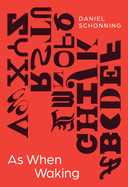
The dazzling poems of Daniel Schonning's elegant debut collection, As When Waking, relish linguistic experimentation and nature imagery.
The core of the book is an astounding set of 26 abecedarians and 10 syllabic pangrams. Each abecedarian starts with a different letter of the alphabet and loops back around (so the "E" poem ends with a "D" line, for instance); the pangrams, brief pieces using all letters of the alphabet at least once, have the repeated heading "[Little Box]." Short iterative sections bookend the main text. Throughout, alliteration and repetition create restful rhythms. "At first, it's as if all/ words are raining/ and from their forms, forms fall." Readers might not fully appreciate the variety of forms until a final note reveals multiple instances of terza rima and specific subtypes Schonning invented, such as a "lattice abecedarian."
Longer, anecdotal pieces alternate with staccato lists and pithy koans. Some of the poems were inspired by artworks, or by figures as varied as Amiri Baraka and William Blake and his wife, Catherine. There are also references to ancient history and Greek mythology and philosophy. Schonning is often in lyric mode. Personal stories of grief, doubt, and addiction are enwrapped in striking language. Nature vocabulary abounds, as in the title poem about ducks on an icy pond: "Two dozen of them/ litter the blue ice--doze against waves frozen/ mid-curl.... / While the mallards/ suck winter sun into/ their dark backs, they dream their way into the pond's green/ underneath." Impressive work indeed. --Rebecca Foster, freelance reviewer, proofreader, and blogger at Bookish Beck

